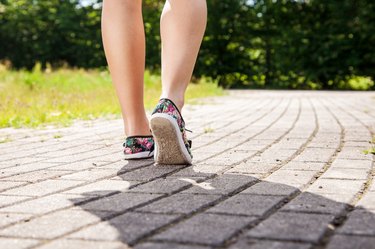
Twitching leg muscles are not uncommon after a long walk or exercise session according to Dr. John Su in an article in the Los Angeles Times. Although muscle twitches may cause you to worry about the health of your leg muscles, in most cases, twitching doesn't indicate a serious underlying medical program. Staying hydrated and warming up completely before walking can help reduce annoying twitches.
Legs Twitch After Walking
Video of the Day
Muscles twitching after a walk occurs due to tiny involuntary muscle contractions in your leg. The problem can also occur in a muscle fibers served by a single nerve. When twitching occurs, you may feel a slight pulling sensation in your leg and may see small, rapid movements in the affected muscle. Other symptoms may occur in conjunction with twitching, such as a tingling feeling in your leg or sudden involuntary movements of the muscle.
Video of the Day
Elements of Twitching
Twitching can occur due to muscle fatigue or result from reduced electrolyte levels. Electrolytes, minerals with an electrical charge, are responsible for maintaining water levels in your body, keeping your pH level stable, supplying nutrients to your cells and removing waste products from cells. You lose electrolytes when you sweat and may notice twitches or cramping occur more often when you walk when the weather is hot or humid.
Legs twitching after exercise can also occur if muscle cells are irritable after activity. Chemical substances that act as neural signals and cause the muscle to contract must be recycled, which can take some time to complete after exercise, says Joel Stager, a kinesiology professor at Indiana University in Bloomington, in the Los Angeles Times.
Muscle twitches can be a symptom of certain conditions or diseases, including fibromyalgia; weak muscles; restless leg syndrome; nerve damage; muscle injury; muscular dystrophy; atrophy of the spinal muscles; or amyotrophic lateral sclerosis, also known as Lou Gehrig's disease. If twitching is severe or chronic, occurs outside of exercise, or you notice weakness, loss of sensation or weakness in a muscle, see your doctor right away for an accurate diagnosis.
What You Consume
The things you eat and drink can contribute to twitching muscles. Consuming large amounts of caffeine or failing to eat a healthy, well-balanced diet can affect your muscles and cause twitches. In some cases, the medications you take to manage medical conditions can cause twitching. This symptom can also occur as a side effect when using diuretics, corticosteroids or medications containing estrogen.
How to Twitch Less
Replacing electrolytes and fluids lost during sweating is an important step in preventing twitching and muscle spasms after walking. While water will help you replace lost fluids, you'll need to drink sports drinks or beverages containing electrolytes to replace depleted minerals.
Stretching before walking or exercising and keeping your muscles warm while you walk may also help reduce or prevent twitching. Massaging a twitching muscle may be helpful in reducing involuntary contractions. In severe cases, your doctor may recommend that you take an anti-spasmodic medication to control twitching.